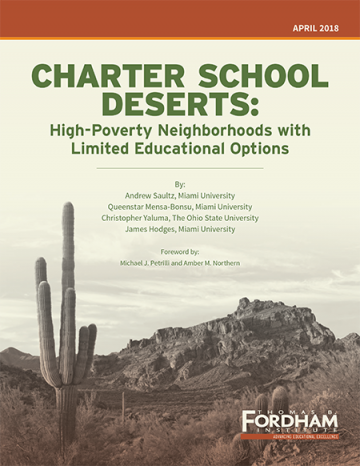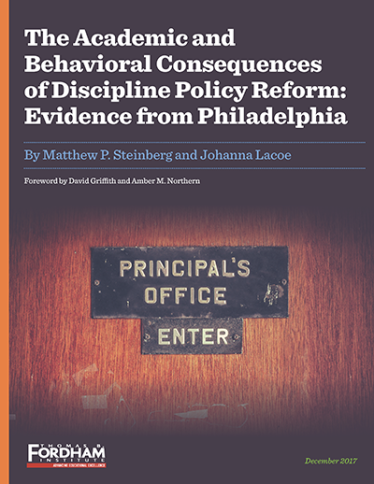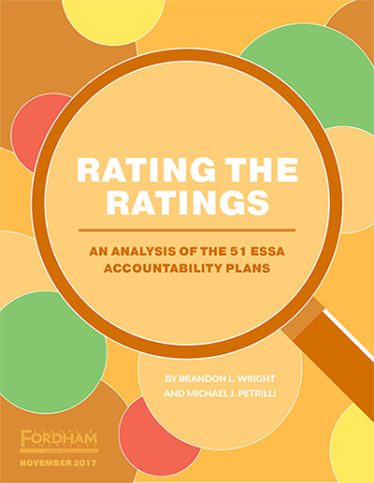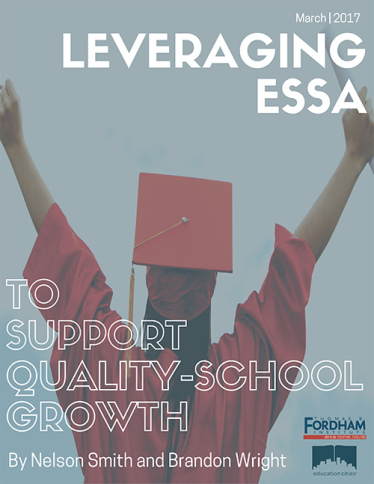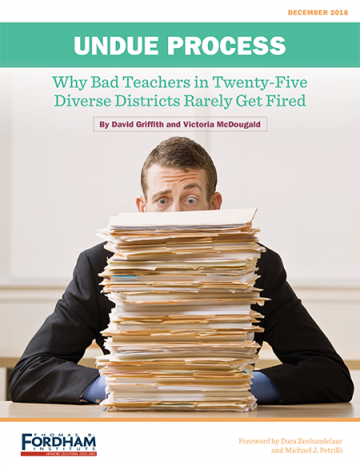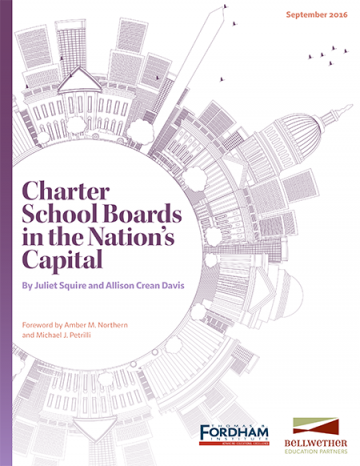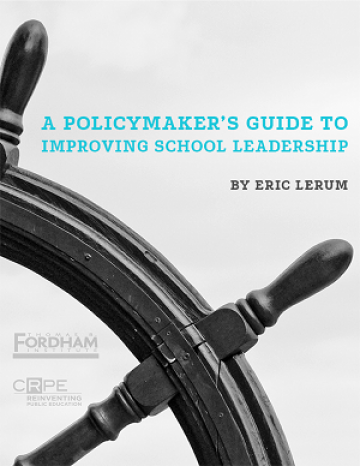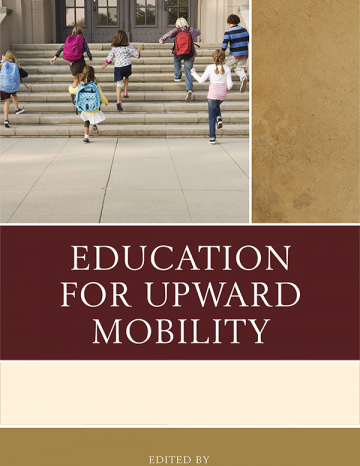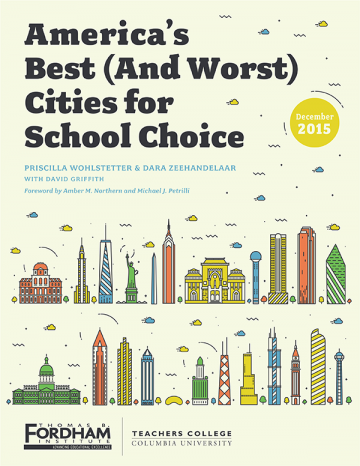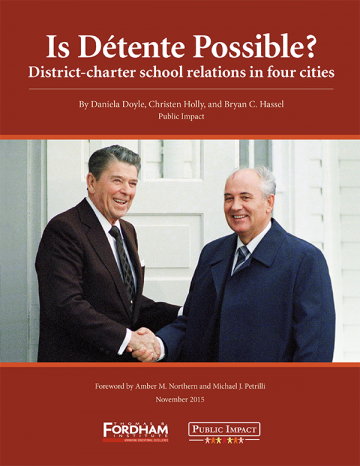Multiple pathways in the Lone Star State
On this week’s podcast, Donna Bahorich, Chair of the Texas State Board of Education, joins Mike Petrilli and David Griffith to discuss how to encourage students to take ownership of their educational journeys. On the Research Minute, Amber Northern examines whether encouraging more students to retake the SAT would narrow college enrollment gaps.
How high schools can boost college completion
On this week’s podcast, Matthew Chingos, director of the Urban Institute’s Education Policy Program, joins Mike Petrilli and Brandon Wright to discuss what high schools should be doing to address the college completion crisis. On the Research Minute, David Griffith examines the impact of New Orleans’s post-Katrina education reforms on short-term and long-term academic outcomes.
Does the admissions process for New York City's selective high schools need fixing?
On this week’s podcast, David Griffith, Adam Tyner, and Brandon Wright discuss New York City Mayor Bill de Blasio’s plan to revamp the admissions process for the city’s selective high schools. On the Research Minute, Amber Northern examines why ELL kids are doing better than we think on NAEP.
How schools can better prepare for the worst
On this week’s podcast, Andy Rotherham, co-founder and partner at Bellwether Education Partners, joins Mike Petrilli and David Griffith to discuss how schools can prevent mass shootings without turning themselves into bunkers. On the Research Minute, Amber Northern examines how warm weather affects student learning.
Halted Hoosiers
On this week’s podcast, Dale Chu, education consultant and Indiana’s former assistant superintendent for innovation and improvement, joins Mike Petrilli and Alyssa Schwenk to discuss what went wrong with Hoosier State school reform. On the Research Minute, David Griffith examines how school improvement grants in Ohio affected achievement and school administration.
Charter School Deserts: High-Poverty Neighborhoods with Limited Educational Options
Andrew Saultz, Queenstar Mensa-Bonsu, Christopher Yaluma, James Hodges2016–17 was one of the slowest-growth years for charter schools in recent memory. Nobody knows exactly why, but one hypothesis is saturation: With charters having achieved market share of over 20 percent in more than three dozen cities, perhaps school supply is starting to meet parental demand, making new charters less necessary and harder to launch.
States lead on education
On this week's podcast, Carissa Moffat Miller, the new executive director of the Council of Chief State School Officers, joins Mike Petrilli and Alyssa Schwenk to discuss CCSSO’s campaign to highlight innovative state education policies. On the Research Minute, Amber Northern examines the effects of the National Heritage Academies chain of for-profit charter schools.
Where is the next "education governor"?
On this week's podcast, Mike Petrilli, Chad Aldis, and Alyssa Schwenk discuss what it will take to get gubernatorial candidates to embrace ed reform. During the Research Minute, Amber Northern examines the cost effectiveness and return on investment of charter schools in eight American cities.
The Olympian challenges facing America's high schools
On this week's podcast, Mike Petrilli, Alyssa Schwenk,
A master class in state policymaking
On this week’s podcast, Benjamin Boer, deputy director at Advance Illinois, joins Mike Petrilli and Alyssa Schwenk to discuss how a coalition of advocates succeeded in getting the Land of Lincoln to overhaul its inequitable school funding formula. During the Research Minute, Amber Northern examines the relationship between high school value added and students’ college success.
The Academic and Behavioral Consequences of Discipline Policy Reform
Matthew P. Steinberg, Johanna LacoeOne important question about school discipline is whether it helps or harms those being disciplined. But a second, equally important question is whether a push to reduce the number of suspensions is harmful to the rule-abiding majority.
Education reform's avocado toast moment
On this week's podcast, special guest Kristen Soltis Anderson—co-founder of Echelon Insights—joins Mike Petrilli and Alyssa Schwenk to discuss millennials’ views on education. During the Research Minute, Amber Northern examines Florida’s universal preschool program, and you’ll never guess what happens to its academic benefits over time.
Rating the Ratings: An Analysis of the 51 ESSA Accountability Plans
Brandon L. Wright, Michael J. PetrilliThe Every Student Succeeds Act grants states more authority over their accountability systems than did No Child Left Behind, but have they seized the opportunity to develop school ratings that are clearer and fairer than those in the past?
Much ado about DeVos
On this week's podcast, special guest Anne Hyslop—education consultant and former Senior Policy Advisor in the Obama Department of Education—joins Alyssa Schwenk and Brandon Wright to discuss staffing and policy issues facing the department under Secretary Betsy DeVos. During the Research Minute, Amber Northern examines how teachers affect students’ attitudes and behaviors.
The contradiction and The Alternative
Jeff MurrayThree years into his first gig as a recruiter/trainer at a job skills program in San Francisco, Mauricio Lim Miller recognized a striking contradiction that changed the trajectory of his life and work.
Yes, Catholic schools need our prayers, but they could use our tax dollars, too
On this week's podcast, special guest Kathleen Porter-Magee, superintendent and chief academic officer of Partnership Schools, joins Brandon Wright and Checker Finn to discuss the state of Catholic schools and what role vouchers might play in their future. During the Research Minute, Amber Northern examines how charter schools affect the performance and spending of nearby district schools in New York City.
Hard lessons from Ohio’s innovation fund
Aaron ChurchillNOTES: John Mullaney is the Executive Director of the Nord Family Foundation. Both authors were part of the Straight A Fund advisory board in FY 14-15.This piece originally appeared in a slightly different form in the Cleveland Plain Dealer.
The summer of school choice discontent
On this week's podcast, special guest Gerard Robinson, a resident fellow at AEI, joins Mike Petrilli and Alyssa Schwenk to discuss House Republicans’ snubbing of the Trump Administration’s school choice proposals. During the Research Minute, David Griffith offers a skeptical look at a University of Arkansas study arguing that “quality control” efforts in school choice programs drive private schools away.
Congress makes a deal
On this week's podcast, special guest John Bailey, a Walton Family Foundation Fellow, joins Mike Petrilli and Alyssa Schwenk to discuss the federal budget deal for the current fiscal year and its effects on education. During the Research Minute, David Griffith examines the effects of Washington, D.C.’s school voucher program on student outcomes and parental satisfaction.
Forget ESSA, let's talk about ESAs!
On this week's podcast, special guest Lindsey Burke, a director at the Heritage Foundation, joins Mike Petrilli and Alyssa Schwenk to discuss Arizona’s tax-scholarship program. During the Research Minute, Amber Northern examines the effects of riding a school bus on student absenteeism.
Wages, Employment, and STEM Education in Ohio, Pennsylvania, and West Virginia
Aaron ChurchillA new report from the RAND Corporation examines trends across 27 counties in Ohio, Pennsylvania, and West Virginia where fracking is a booming business. Nine of these counties are in Eastern Ohio, including Mahoning, Stark, Belmont, and several others.
The making of a state ESSA plan
On this week's podcast, Checker Finn, Alyssa Schwenk, and Brandon Wright discuss the drafting of an ESSA plan and what comes next for states that recently submitted theirs to the U.S. Department of Education. During the Research Minute, David Griffith examines the long-term effects of same-race teachers.
Leveraging ESSA to Support Quality-School Growth
Nelson Smith, Brandon L. WrightUnder the Every Student Succeeds Act, the federal School Improvement Grants program is gone, but the goal of school improvement remains. States must now use seven percent of their Title I allocation for these efforts, but are no longer constrained by a prescribed menu of intervention options.
Undue Process: Why Bad Teachers in Twenty-Five Diverse Districts Rarely Get Fired
Victoria McDougald, David GriffithCountless studies have demonstrated that teacher quality is the most important school-based determinant of student learning, and that removing ineffective teachers from the classroom could greatly benefit students.
Charter School Boards in the Nation's Capital
Juliet Squire, Allison Crean DavisTens of thousands of individuals across the United States volunteer their time, energy, and expertise as members of charter school boards. Yet as the charter sector has grown, we’ve learned remarkably little about these individuals who make key operational decisions about their schools and have legal and moral responsibilities for the education of children in their communities.
A Policymaker's Guide to Improving School Leadership
Eric LerumWhether the goal is to enhance instruction, create a culture of excellence, or broaden education options for parents, it’s nearly impossible to improve schools without strong leaders. This is hardly news; much evidence has indicated the importance of effective principals for decades.
Education for Upward Mobility
Michael J. PetrilliIn Education for Upward Mobility, editor Michael J. Petrilli and more than a dozen leading scholars and policy analysts seek answers to a fundamental question: How can we help children born into poverty transcend their disadvantages and enter the middle class as adults? And in particular, what role can our schools play?
America's Best (and Worst) Cities for School Choice
Priscilla Wohlstetter, Ph.D., Dara Zeehandelaar Shaw, Ph.D., David GriffithMore than twelve million American students exercise some form of school choice by going to a charter, magnet, or private school——instead of attending a traditional public school.
Is Detente Possible? District-charter school relations in four cities
Daniela Doyle, Christen Holly, Bryan C. HasselWhether you think the end game of the current “mixed economy” of district and charter schools should be an all-charter system (as in New Orleans) or a dual model (as in Washington D.C.), for the foreseeable future most cities are likely to continue with a blend of these two sectors. So we wanted to know: Can they peacefully co-exist? Can they do better than that?


